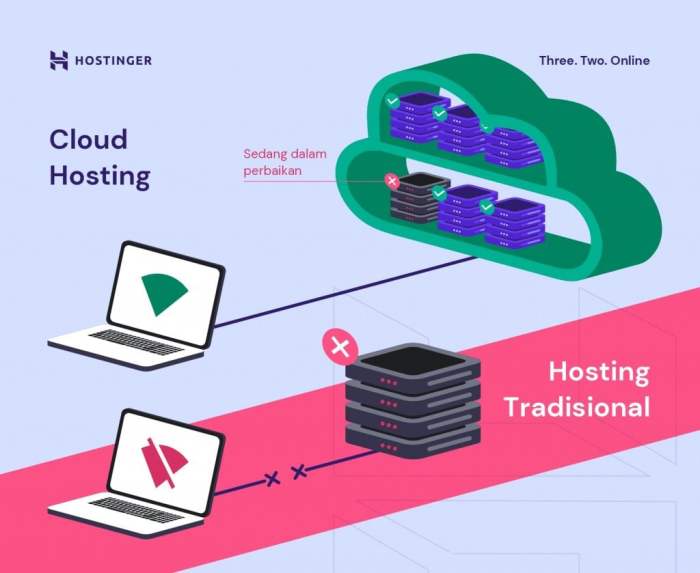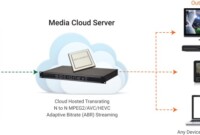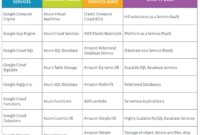Cloud hosting for small businesses with low traffic offers a compelling solution for businesses seeking to establish a strong online presence without breaking the bank. Cloud hosting eliminates the need for expensive hardware and complex server management, allowing small businesses to focus on what truly matters: growing their brand and reaching their target audience.
This cost-effective approach empowers businesses to scale their operations as needed, ensuring they have the resources to meet evolving demands without sacrificing performance or reliability.
The advantages of cloud hosting are undeniable for small businesses with low traffic. Cloud hosting providers offer a range of flexible plans tailored to specific needs, enabling businesses to choose the perfect solution for their budget and growth trajectory.
Furthermore, cloud hosting empowers businesses with robust security features and reliable uptime, ensuring that their websites and data are protected from threats and accessible to customers at all times. The inherent scalability of cloud hosting allows businesses to seamlessly adapt to increasing traffic and demand, ensuring a smooth and uninterrupted user experience.
Cloud Hosting for Small Businesses
Cloud hosting is a type of web hosting where your website’s files and data are stored on a network of servers instead of a single physical server. This network of servers is owned and maintained by a third-party provider, which allows you to access your website and its resources from anywhere with an internet connection.
Cloud hosting is particularly beneficial for small businesses with low traffic because it offers a cost-effective and scalable solution. It eliminates the need for expensive hardware and software investments, allowing you to focus your resources on other aspects of your business.
Advantages of Cloud Hosting for Small Businesses with Low Traffic
Cloud hosting offers several key advantages for small businesses with low traffic, making it an ideal choice for their web hosting needs.
- Cost-effectiveness:Cloud hosting providers offer flexible pricing plans that are tailored to your specific needs. You only pay for the resources you use, making it a cost-effective solution compared to traditional hosting options, especially for businesses with low traffic.
This means you avoid the high upfront costs associated with purchasing and maintaining your own hardware.
- Scalability:Cloud hosting allows you to easily scale your resources up or down as your traffic fluctuates. This means you can adjust your hosting plan based on your website’s performance, ensuring that you are not paying for resources you don’t need.
This flexibility is crucial for small businesses, as their traffic patterns can be unpredictable, and they can quickly adjust their hosting resources to meet their changing needs.
- Reliability:Cloud hosting offers high availability and redundancy, ensuring that your website remains online even if one server fails. This is achieved through the use of multiple servers that are interconnected and can seamlessly take over if one server experiences downtime.
This level of reliability is essential for small businesses, as downtime can lead to lost revenue and customer dissatisfaction.
- Security:Cloud hosting providers offer robust security measures, including firewalls, intrusion detection systems, and regular security updates. These measures help protect your website and data from cyber threats, ensuring the safety and integrity of your online presence.
Key Features for Small Businesses

For small businesses with low traffic, choosing the right cloud hosting provider is crucial. You need a provider that offers the essential features to help your business grow without breaking the bank. This section explores key features that are essential for small businesses with low traffic and explains how they benefit your business.
Website Builder, Cloud hosting for small businesses with low traffic
A website builder is a valuable tool for small businesses that lack web development expertise. It allows you to create a professional-looking website without coding knowledge. Cloud hosting providers often include website builders in their packages, making it easy for you to get your website up and running quickly.
Here are some benefits of using a website builder:
- Ease of Use:Website builders are designed to be user-friendly, even for those with no prior experience. They offer drag-and-drop interfaces and pre-designed templates, making it simple to create a website.
- Cost-Effectiveness:Using a website builder is often more affordable than hiring a web developer, especially for small businesses with limited budgets.
- Customization Options:While website builders offer pre-designed templates, they also allow for customization. You can adjust colors, fonts, and layouts to create a website that reflects your brand identity.
Email Accounts
Email is essential for any business, regardless of size. Cloud hosting providers typically offer email accounts as part of their packages, allowing you to create professional email addresses using your domain name (e.g., info@yourbusiness.com).Here’s how email accounts benefit your business:
- Professionalism:Using professional email addresses enhances your business’s image and builds trust with clients and partners.
- Improved Communication:Having dedicated email accounts for your business makes communication more organized and efficient.
- Security:Cloud hosting providers typically implement robust security measures to protect your email accounts from spam and malware.
Security Measures
Data security is paramount for any business, and cloud hosting providers offer various security measures to protect your website and data. These measures include:
- Firewalls:Firewalls act as a barrier between your website and the internet, preventing unauthorized access and malicious attacks.
- Anti-Malware Software:Anti-malware software scans your website for threats and removes them, protecting your data from viruses and other harmful programs.
- Data Backups:Cloud hosting providers often provide regular data backups, ensuring that your website and data can be restored in case of a disaster or data loss.
- SSL Certificates:SSL certificates encrypt data transmitted between your website and visitors, protecting sensitive information like credit card details.
Comparing Feature Sets
Cloud hosting providers offer different feature sets, so it’s essential to compare them before making a decision. Here are some key factors to consider:
- Website Builder Features:Some providers offer more advanced website builders with more customization options and features.
- Email Account Features:Consider the storage space, email client integration, and spam filtering capabilities offered by different providers.
- Security Features:Compare the security measures offered by different providers, including firewalls, anti-malware software, data backup options, and SSL certificates.
- Customer Support:Look for providers that offer 24/7 customer support and responsive technical assistance.
- Pricing:Compare the pricing plans offered by different providers, considering the features included in each plan.
Security and Reliability

When choosing a cloud hosting provider, security and reliability are paramount. Your data, applications, and website are your digital assets, and ensuring their safety and accessibility is crucial for your business success.
Data Security Best Practices
Data security in the cloud is a shared responsibility between you and your hosting provider. Here are some best practices to protect your data:
- Strong Passwords:Use strong, unique passwords for all your accounts, including your cloud hosting platform. Avoid using common words or personal information.
- Two-Factor Authentication:Enable two-factor authentication for all accounts. This adds an extra layer of security by requiring a code from your phone or email in addition to your password.
- Regular Security Updates:Ensure your cloud hosting provider regularly updates its software and security patches. This protects against known vulnerabilities.
- Secure Socket Layer (SSL):Use SSL certificates to encrypt data transmitted between your website and visitors. This ensures secure communication and protects sensitive information.
- Data Encryption:Encrypt your data both at rest and in transit. This prevents unauthorized access to your data, even if the cloud provider’s servers are compromised.
Importance of Reliable Uptime and Data Backup
Reliable uptime and data backup are essential for maintaining business continuity and preventing data loss.
- Uptime:Consistent uptime ensures your website and applications are accessible to your customers at all times. This is critical for maintaining customer satisfaction and maximizing sales.
- Data Backup:Regular data backups safeguard your data against accidental deletion, hardware failures, or cyberattacks. This ensures you can recover your data if it is lost or corrupted.
Cloud Hosting Provider Security and Reliability Measures
Cloud hosting providers employ various measures to ensure the security and reliability of their services. These include:
- Redundant Infrastructure:Cloud providers use redundant servers and data centers to minimize downtime. This ensures your data and applications are always accessible, even if one server fails.
- Data Center Security:Cloud providers invest in physical security measures to protect their data centers from unauthorized access. This includes security guards, surveillance cameras, and access control systems.
- Security Monitoring:Cloud providers constantly monitor their systems for security threats and vulnerabilities. This allows them to quickly identify and address any issues before they impact your data.
- Disaster Recovery:Cloud providers have disaster recovery plans in place to ensure your data and applications are protected in case of a major disaster. This includes data replication and failover mechanisms.
Managing Your Cloud Hosting

Managing your cloud hosting account is essential for ensuring your website’s performance and security. Cloud hosting providers offer various tools and interfaces to help you control and optimize your resources.
Setting Up Your Cloud Hosting Account
The initial setup of your cloud hosting account involves choosing a provider, selecting a plan, and configuring your website.
- Choose a Cloud Hosting Provider:Consider factors like pricing, features, customer support, and scalability. Popular providers include Amazon Web Services (AWS), Google Cloud Platform (GCP), and Microsoft Azure.
- Select a Plan:Based on your website’s needs, choose a plan that offers sufficient storage, bandwidth, and processing power. Most providers offer various plans with different levels of resources.
- Configure Your Website:This step involves uploading your website files, setting up your domain name, and configuring your database. Most cloud hosting providers offer easy-to-use interfaces and tools to simplify this process.
Common Cloud Hosting Management Tools
Cloud hosting providers offer a range of tools to manage your account, including:
- Control Panel:A web-based interface that provides access to various management functions, such as website files, databases, email accounts, and security settings.
- Command Line Interface (CLI):A text-based interface that allows advanced users to manage cloud resources through commands. It offers greater flexibility and automation capabilities.
- API (Application Programming Interface):A set of protocols that enable communication between your application and the cloud provider’s infrastructure, allowing you to automate tasks and integrate with other services.
Optimizing Cloud Hosting Performance
Optimizing your cloud hosting environment ensures your website performs efficiently and delivers a positive user experience.
- Choose the Right Instance Type:Select an instance type that aligns with your website’s resource requirements, balancing cost and performance.
- Optimize Website Code:Minimize HTTP requests, compress images, and use caching mechanisms to improve website loading speed.
- Monitor Performance:Regularly track website performance metrics, such as page load times and server response times, to identify bottlenecks and areas for improvement.
Ensuring Cloud Hosting Security
Security is paramount in cloud hosting, protecting your website and data from malicious attacks.
- Use Strong Passwords:Implement strong and unique passwords for all accounts associated with your cloud hosting.
- Enable Two-Factor Authentication:Add an extra layer of security by requiring a second authentication factor, such as a code sent to your phone or email.
- Keep Software Updated:Regularly update your website software and plugins to patch vulnerabilities and protect against known security threats.
- Use a Web Application Firewall (WAF):A WAF acts as a security barrier, blocking malicious traffic and protecting your website from common attacks.
Case Studies and Examples: Cloud Hosting For Small Businesses With Low Traffic

Seeing real-world examples of small businesses benefiting from cloud hosting can provide valuable insights into its potential for your own business. These case studies demonstrate how cloud hosting can address specific challenges and drive growth for businesses of all sizes.
Real-World Examples of Cloud Hosting Success
Here are a few examples of small businesses that have successfully implemented cloud hosting and experienced significant benefits:
| Company Name | Industry | Cloud Hosting Provider | Benefits |
|---|---|---|---|
| [Company Name] | [Industry] | [Cloud Hosting Provider] | [Benefits] |
| [Company Name] | [Industry] | [Cloud Hosting Provider] | [Benefits] |
| [Company Name] | [Industry] | [Cloud Hosting Provider] | [Benefits] |
| [Company Name] | [Industry] | [Cloud Hosting Provider] | [Benefits] |
Epilogue
In conclusion, cloud hosting for small businesses with low traffic represents a transformative approach to web hosting, providing an array of benefits that empower businesses to thrive in the digital landscape. By leveraging the power of cloud technology, small businesses can access the resources and flexibility they need to establish a strong online presence, manage their budget effectively, and scale their operations as they grow.
With its cost-effectiveness, scalability, security, and reliability, cloud hosting provides the ideal foundation for small businesses to achieve their digital goals and achieve lasting success.

